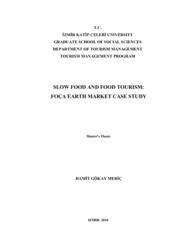Slow food and food tourism: Foça earth market case study
-
Eser Sahibi
Meriç, Hamit Gökay
- Tez Danışmanı Gülşah AKKUŞ
-
Tür
Yüksek Lisans
- Yayın Tarihi 2016
-
Yayıncı
İzmir Katip Çelebi Üniversitesi Sosyal Bilimler Enstitüsü
- Tek Biçim Adres Http://hdl.handle.net/11469/653
-
Konu Başlıkları
Yavaş yemek
Slow food
Yemek turizmi
Food tourism
Yeryüzü pazarı
Earth market
Destinations are most attractive for the tourists with their unique cultural
elements and food is a substantial amount of the unique local identity. Therefore,
food tourism has always been a very important aspect of the destination and tourists
have always been eager to try unique tastes of the culinary culture in the destination
they are visiting. In this thesis study, the concepts of food tourism and food tourists
are explained in detail and their importance in the context of destinations is
mentioned with concrete reasons.
On the other hand, the industrial revolution, which took place recently,
created today's highly integrated and typical global markets. This rapid change also
forced people around the world to have a typical life style with common interests,
hobbies and tastes. This standardization and singularity affected nations’ culinary
culture and created monotype, relatively tasteless and “fast” food. As a result, the
culinary cultures of different places started to dissolve. This was a reflection of the
globalized and similarized world and it made an impact on the food cultures of
communities, even exposing them to the danger of perishing. This problem
necessitated a comprehensive movement to protect the unique food cultures of
nations, as they are a significant part of the destinations’ identities.
Slow Food movement was born in the 1980’s as an answer to this progress
and became a major influence for countries. Starting in Italy, Slow Food is a highly
recognized, almost brand-like, organization and movement around the world today.
It has strict regulations and the main aim of this organization is to protect the
cultural food heritage besides ensuring a healthy agricultural production. The basic
principles of this movement, such as good, clean and fair food, and the brief history
of the organization are explained thoroughly in this thesis study.
viii
Being an active Slow Food point and carrying out the regulations and
principles of Slow Food create a certain attraction for destinations. The main reason
behind this is that Slow Food is a worldwide-recognized organization and it creates
an attraction point for green tourists, food tourists and ordinary tourists with its
support to sustainable local production besides offering cultural experiences,
providing ethical tourism mobility and protecting the local identity. This study also
discusses the effects of Slow Food on the destination’s food culture and food
production as well as the touristic attraction it creates in the context of food
tourism.
For this purpose, Earth Markets, which are solid applications of Slow Food,
are investigated in this thesis and through the case study of Foça Earth Market.
Foça is a seaside town in Turkey near Izmir and it is a major touristic destination.
Therefore, the Earth Market in Foça is a perfect example for investigating the
effects of Slow Food principles on a destination. The thesis' objective is to show
how the application of Earth Markets create an attraction and at the same time
protects both the local producers and the local values of the destination in order to
obtain a balanced result for the touristic activities, sustainability and economic
benefits.
The research about Foça Earth Market was conducted face-to-face in the
market area as structured interviews, semi-structured interviews and on-site
observations. The collected data were then evaluated by the help of qualitative
research techniques and the results were explained thoroughly. According to the
research results, Slow Food’s regulations are followed in Foça Earth Market and
therefore, it helps to protect the local identity and products. Also, since Slow Food
is a well known brand it adds to the image of the destination and it is observed that
it has an important role for destination attractiveness in the context of food tourism.
It is found in the research results that the Slow Food applications contribute to
touristic development of destinations but at the same time provide a sustainable
production and protect the local economy creating a balance for the stakeholders
and the destination.
-
Koleksiyonlar
ENSTİTÜLER
SOSYAL BİLİMLER ENSTİTÜSÜ

 Tam Metin
Tam Metin

